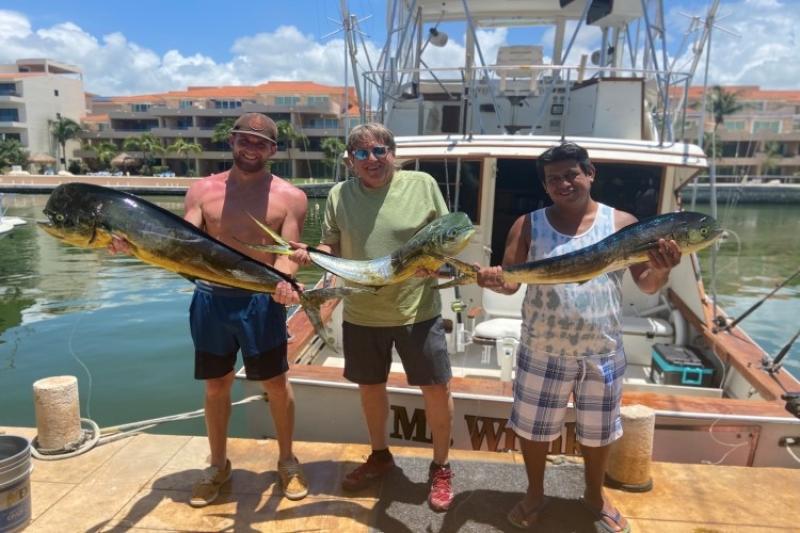
Scientists consider more adaptive approaches to Atlantic Dolphinfish management
by NOAA Fisheries 5 Nov 2022 12:23 PDT

Friends enjoying a recreational fishing trip where they caught two bull and one cow dolphinfish (Atlantic mahi mahi) © Ellie Hartman
During community workshops, dolphinfish anglers provide useful feedback to inform scientists for management strategy evaluation.
One of the challenges in managing dolphinfish populations (also known as mahi mahi) along the Atlantic coast is that they migrate to international waters. No international agreements for management currently exist. Another challenge stems from the short-lived biology of the fish. Dolphinfish grow and reproduce quickly, but their reproductive success and availability to fishermen is largely driven by environmental conditions, which tend to fluctuate from year-to-year. Anyone who fishes for mahi mahi can attest to their "here today, gone tomorrow" dynamics that make them such a challenging—but extremely rewarding—fishing target.
Another challenge in managing the population is that catch limits are fixed based on historical landings data, and don't fluctuate as the local availability of dolphinfish does. Fishermen can't take advantage of "good" years, where more dolphinfish are available. Conversely, when fewer dolphinfish are available, equitable access along the Atlantic coast and by sector is not guaranteed, and we risk over-exploiting the population.
Dolphinfish are delicious. Mahi dishes have become a staple in many restaurants, though almost all of what we see in restaurants and grocery stores across the country comes from the Pacific. They are a prized component of the South Atlantic recreational fishery, which includes the charter industry—allocated 93 percent of the annual catch limit. They are also important for commercial fishermen who comprise the other 7 percent; a smaller, but nonetheless important component.
A More Nimble Approach for Managing a Dynamic Fishery
Given all of those variables, we are working on a new, more adaptive approach to managing this fishery. Scientists from NOAA's Southeast Fisheries Science Center, in collaboration with the South Atlantic Fishery Management Council, are embarking on a management strategy evaluation. The process involves developing and testing a number of different strategies to identify which procedures best align with desired objectives.
The goal is to develop a framework that can determine what the annual supply of dolphinfish is going to be in the United States early in the fishing season. Then, we can ensure that all the different regions and user groups are able to access the stock equally. In good years everyone shares the bounty, and in poor years everyone shares in some reductions.
Stakeholder Participation
A key component of the Management Strategy Evaluation is to obtain stakeholder feedback. This can help us to identify key drivers of the system, define management objectives, and build better management procedures.
"The discussions that we are having with stakeholders at these workshops directly influence the scenarios that we are looking at and how we are measuring management performance," says Dr. Cassidy Peterson, the science center's management strategy evaluation expert. "Testing out realistic scenarios allows us to build novel or alternative management procedures that are most appropriate for the fishery."
The first of these interactions occurred in 2020 and 2021, where we worked with participants to better understand the dolphinfish fishery in the Southeast. We wanted to learn about the physical, biological, social, economic, and institutional aspects of the fishery.
Results from the earlier workshops indicated that we need a more flexible management approach. We needed to find an approach that would allow us to respond to changing conditions and levels of abundance, and to account for regional differences in the dolphinfish fishery. So, in October, we started a second round of workshops to get feedback on the next steps.
"One of the interesting things we've heard at these workshops is that there are some clear regional differences in what fishermen are seeing on the water. For example, fishermen in Florida have noted a severe and sudden decline in dolphinfish abundance and size, whereas in North Carolina and Virginia we are not hearing these concerns," said Dr. Mandy Karnauskas, an ecosystem scientist with the science center. "These regional differences are part of what we're trying to understand, so that we can have an adaptive and effective management strategy in place.
Fisheries Management Isn't Just about Fish
Successfully managing fisheries requires considering all uses of the fishery—including people. Through these workshops and conversations, our goal is to develop a management approach that is adaptable to many needs.
Learn more about the scheduled workshops and planned next steps.